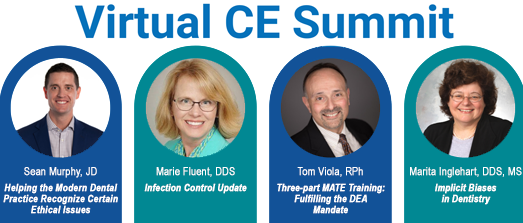Virtual CE Summit: DEA MATE Courses
A remote day of learning offering courses that meet license requirements.
This set of events is virtual via zoom. Zoom registration links will be sent to you via email after completing your registration.
Event Details
8 – 10:30 am
‘Mind Over Molars!’: The Role of Peripherally-Acting Non-Opioid Analgesics in Dental Pain Management
As the dental profession continues to shift away from routine opioid prescribing, non-opioid analgesics have taken center stage in pain management protocols. This course is designed to equip dentists with the most current evidence and clinical guidance on the safe, effective use of non-opioid medications — including NSAIDs, acetaminophen, and combination therapy — for the treatment of acute dental pain. Emphasis will be placed on pharmacology, dosing strategies, contraindications, and patient-specific considerations, with a focus on minimizing risk while maximizing pain control. Participants will leave with the tools to confidently manage pain using opioid-sparing approaches aligned with today’s best practices.
- Describe the mechanisms of action, pharmacokinetics, and therapeutic effects of commonly used non-opioid analgesics, including NSAIDs and acetaminophen.
- Compare the efficacy of non-opioid medications to opioid analgesics for the treatment of acute dental pain.
- Recognize contraindications, adverse effects, and drug interactions associated with non-opioid analgesics, especially in medically complex patients.
- Develop individualized pain management plans that emphasize non-opioid options and minimize opioid exposure.
11 am – 1:30 pm
‘On My Last Nerve!’: The Role of Centrally-Acting and Opioid Analgesics in Dental Pain Management
Opioid analgesics have long played a role in managing acute dental pain, but their use now requires careful consideration due to the ongoing opioid crisis and evolving clinical guidelines. This course provides dentists with an evidence-based framework for the judicious use of opioids in dental practice. Topics include indications for opioid use, comparative effectiveness with non-opioid alternatives, risk assessment for misuse, appropriate dosing and duration, and regulatory compliance. Emphasis is placed on safe prescribing practices, patient education, and the integration of opioid therapy into a broader, multimodal pain management strategy.
- Describe the pharmacology, therapeutic effects, and appropriate indications for opioid analgesics in dental practice.
- Differentiate between opioid and non-opioid analgesics in terms of efficacy, safety, and patient-specific considerations.
- Identify patients who may benefit from opioid therapy for acute dental pain and those at higher risk for misuse or adverse outcomes.
- Recognize signs of opioid use disorder and understand how to refer patients for appropriate care.
2 – 5 p.m.
‘Welcome to The Dark Side:’ The Use of Illicit Substances … and the Illicit Use of Licit Substances …And Their Dental Implications
Substance misuse—whether involving illicit drugs or the inappropriate use of prescription medications—presents growing challenges for dental practitioners. This course equips dentists with the clinical insight and judgment needed to recognize the oral and systemic effects of substance use, safely treat affected patients, and mitigate risk in the dental setting. Participants will explore commonly encountered substances such as methamphetamine, cocaine, heroin, benzodiazepines, stimulants, and prescription opioids, and learn how these substances impact anesthesia, healing, behavior, and drug interactions. Through real-world cases and evidence-based guidance, dentists will gain confidence in navigating treatment planning, communication, and referrals for patients struggling with substance use or exhibiting signs of misuse.
- Understand how specific substances (e.g., methamphetamine, cocaine, cannabis, opioids, benzodiazepines) impact anesthesia, healing, and patient management.
- Assess the risks of drug interactions and adverse events when providing treatment to patients who use or misuse substances.
- Modify treatment plans and pain management strategies for patients with active or historical substance use.
- Implement appropriate communication strategies for discussing substance use with patients in a nonjudgmental manner.
- Recognize oral, behavioral, and systemic signs of substance use or misuse.
These courses count toward Michigan Board of Dentistry’s pain management requirement and the DEA MATE requirement to obtain or renew the controlled substance pharmacy license for dentists.
For More Information:

With over 30 years’ experience as a board-certified pharmacist, clinical educator, professional speaker and published author, Tom Viola has earned his national and international reputation as the go-to specialist for making pharmacology practical and useful for all members of the dental team. As the founder of Pharmacology Declassified, Viola provides insight into the complex interplay between pharmacology and physiology. He has presented over 1,000 informative, humorous and engaging continuing education seminars and webinars to dental professionals internationally since 2001, and has served as a contributor, chapter author and peer reviewer for several pharmacology textbooks. Viola currently serves as a consultant to the American Dental Association’s Council on Scientific Affairs.


